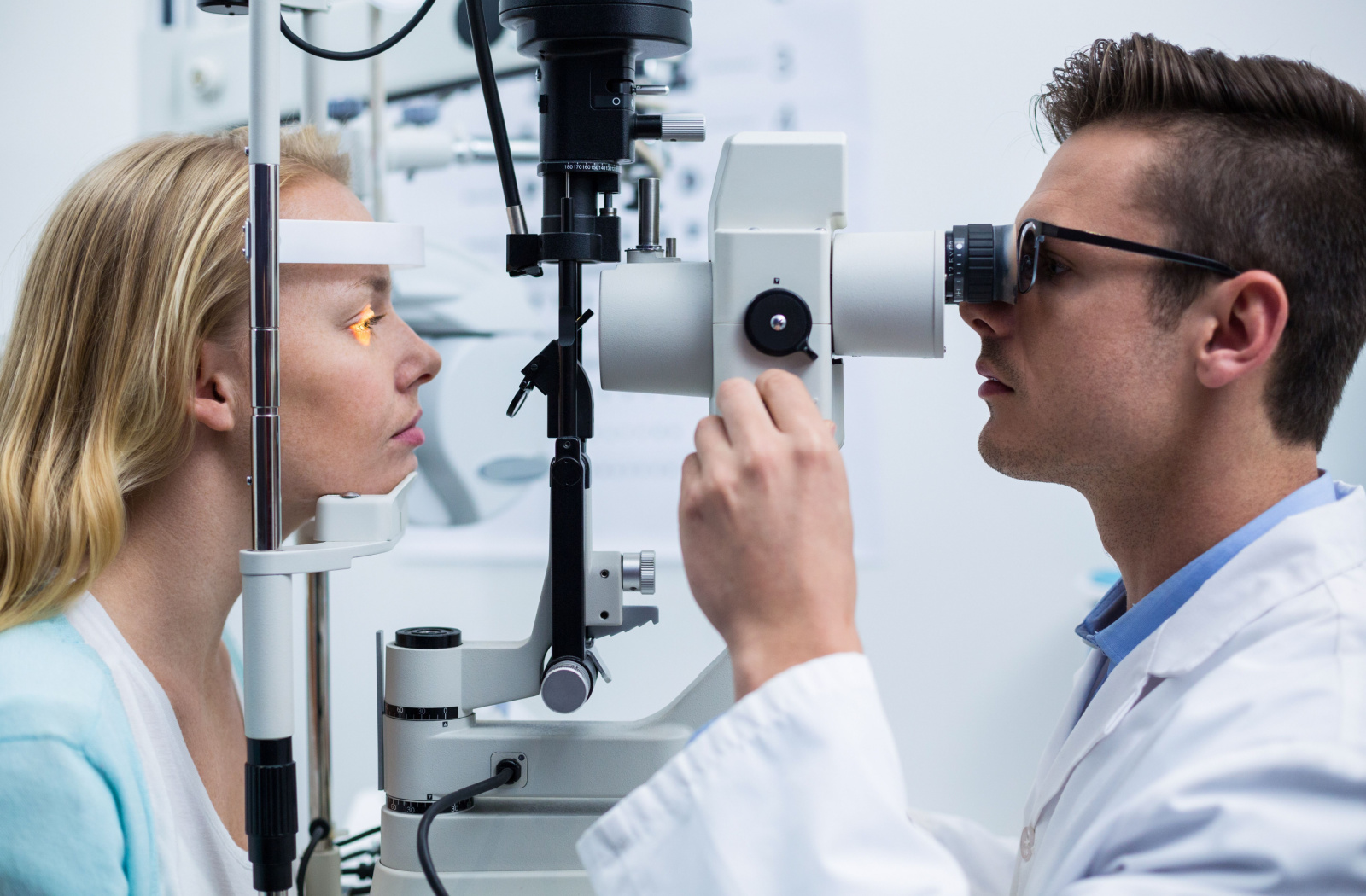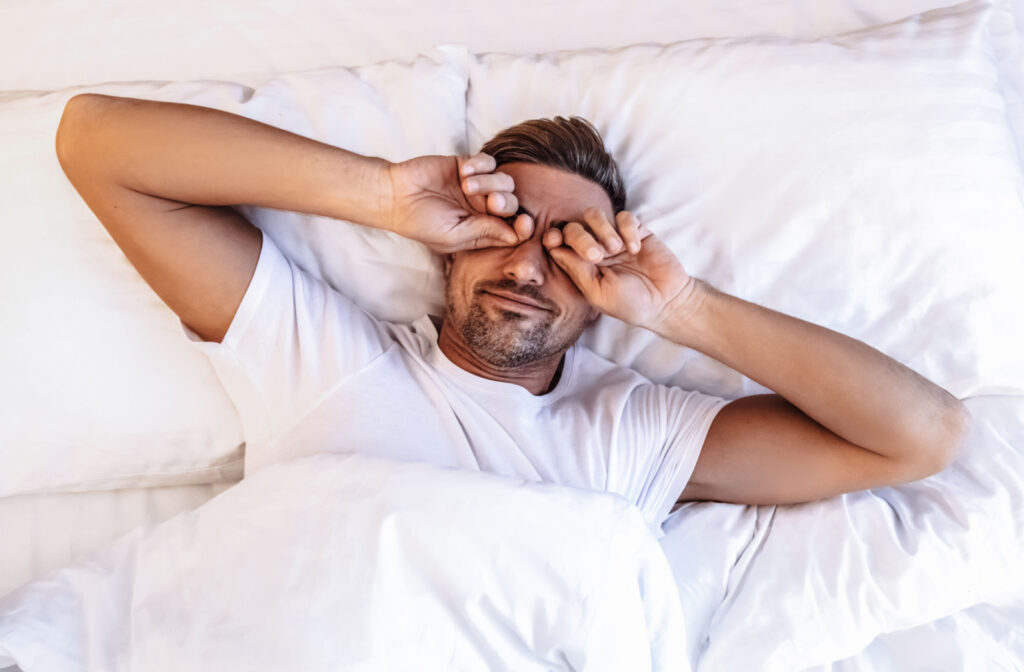Waking up with dry eyes isn’t just uncomfortable—it can make you start your day worried about your eye health. Your optometrist can help, and with a comprehensive eye exam, they can provide a diagnosis and treatment for your morning dry eyes. But still: why do you have dry eyes in the morning?
Morning dry eyes are often due to:
- Poor sleep quality
- Environmental factors
- Nutritional deficiencies
- Medications
- Medical conditions
- Nocturnal lagophthalmos
1. Poor Sleep Quality
When you wake up with dry eyes, the first thing to think about is how much sleep you got—and its quality. Poor sleep quality can have a significant effect on most of your body, and the eyes are no exception.
During a restful night’s sleep, your body goes through vital restorative processes, including the production of tears that lubricate and protect the eyes. If your sleep is fragmented, interrupted, or too short, this process can be disrupted. This may lead to further problems with your tear production and can leave your eyes exposed. This is just one reason why a good night’s sleep is so essential!
2. Environmental Factors
Your environment plays a bigger role in your eye comfort than you might think. When you live in a particularly dry, smoky, or windy environment, your eyes have to work harder to produce adequate tears to protect themselves. Over time, your tear production can become significantly impacted by this.
Both heating systems and air conditioner systems produce dry air, which can sap moisture from the surrounding environment. Plus, many people who sleep with fans on or windows open may deal with tear evaporation during the night. It may help to adjust your sleeping environment or use a humidifier to maintain appropriate humidity while you sleep.
3. Nutritional Deficiencies
The human eye is an incredibly complex organ, and it’s part of an extremely complicated visual system. It requires a mix of specific vitamins, nutrients, and minerals so that it can do its job. So when you have certain nutritional deficiencies, it can often lead to dry eye development.
This is why it’s so crucial to follow a proper balanced diet. Make sure you’re including:
- Omega-3 fatty acids, which are found in most fatty fish and supplement form
- Vitamin A-rich foods like carrots, sweet potatoes, and green leafy vegetables=
- Antioxidants found in berries, nuts, and other fruits and vegetables
- Vitamin E, which is prevalent in nuts and seeds like almonds and sunflower seeds
- Vitamin C-rich foods including oranges, strawberries, and bell peppers
- Zinc, found in oysters, beef, and chickpeas
This way, you can give your eyes the tools they need to properly do their job.
4. Medications
Certain medications can have odd side effects. Some indirectly can affect tear production or composition, while others may make existing symptoms of dry eyes worse. Common culprits of dry eyes in the morning include:
- Antihistamines
- Decongestants
- Blood pressure medications
- Antidepressants
- Certain acne medications like Accutane
These all may be affecting your tear production or composition. If you’re taking any of these medications, consider speaking with your optometrist to discuss the potential side effects and whether any alternatives exist.
5. Medical Conditions
A range of possible underlying medical conditions that could be affecting your tear production.
These include:
- Sjogren’s syndrome, a condition where the body’s immune system attacks its moisture-producing glands
- Rheumatoid arthritis, an autoimmune disorder that can affect the eyes and cause dryness
- Diabetes, which can impact eye health in several ways
- Thyroid disorders
- Blepharitis, an inflammation of the eyelids, which can interfere with the healthy production and distribution of tears
If you have any of these conditions, make sure to discuss them with your optometrist during your next eye exam. They may be able to recommend appropriate treatment or advice on managing your conditions so it has less of an effect on your eyes.
6. Nocturnal Lagophthalmos
Nocturnal lagophthalmos is a condition where you body doesn’t fully close the eyelids during sleep. While your body is trying to rest and recuperate, your eyes are open and exposed to the environment around you. This can lead to dry, irritated eyes immediately upon waking up. They may be red, a little swollen, or even watery as the eye tries to flood the dry area with tears.
Many people with this condition don’t realize they have it, especially if they live alone. However, if you’re constantly waking up with dry eyes, it can help to speak with your optometrist to determine if nocturnal lagophthalmos could be causing your problems. They may recommend eye drops or even taping your eyelids shut at night with special tape.

What to Do if You Have Dry Eyes When You Wake Up
If waking up with dry eyes is interfering with your start to the day, it’s time to reach out to our team at River City Vision Center. When it comes to your eyes, it’s always beneficial to get professional advice, and our team is here to help. Book an appointment with us today, and let’s work together to give you a more pleasant start to the day.





